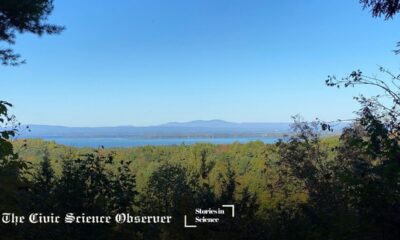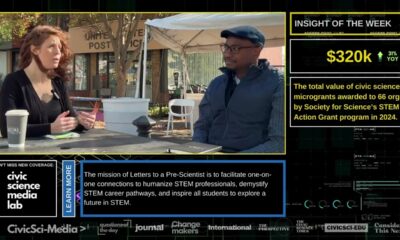Stories in Science Special Series
Be more confident and optimistic

– by Claudia Segovia-Salcedo | Universidad de las Fuerzas Armadas ESPE | Coordinator and co-founder of the Ecuadorian Network of Women in Science (REMCI) –
The story below was originally published by The Female Scientist which aims to make the work of female scientists around the world more visible to the public. You can follow them on twitter HERE.
Do you come from an academic family?
I come from a family where education was important. My parents were born in the Southern provinces of Ecuador and they moved to Quito, the capital, to pursue a higher education and to get a better quality of life. They always supported me even though they were not sure about my career choice. They expected that I became a doctor of medicine, not a doctor of botany. My father was learning with me about genetics, molecular biology, and conservation, and now he is one of the most enthusiastic fans of my research projects.
Also, I was lucky to find a partner in biology. My husband, a wildlife ecologist, has played a fundamental role supporting me, especially during my graduate studies. We decided to pursue a Ph.D. in another country with two kids (2 and 5 years old at that time). It was a great challenge, but we did it together. It was a family effort that made us stronger. Now, we are back in Ecuador applying our knowledge to conserve our biodiversity.
Did you have a role model that influenced your decision to work in science?
When I think about role models, I think of my parents, especially my mother. Now retired, my mother was a working mom her whole career. She worked her entire career as a social worker in a public high school in Ecuador. Even though she was not working in science, her example generated that I never thought that I would be anything other than a working mom. It is not easy, but it is definitely worth it.
During my career, I have been and continue to be influenced by many people from my high school from my biology teacher, to professors and colleagues. However, I would like to highlight Pam and Doug Soltis, they were my Ph.D. advisors at the University of Florida. They are sharp thinkers, critical but at the same time open, very supportive and encouraging. They combined their academic work, their support of community services with being mother and father. Definitely, they have helped with my personal and career development and still do.
Which topic are you working on at the moment? Why did you choose this topic and how do you think you’ll make a difference?
I work in Andean plant evolution, specifically in the Tree Genus Polylepis (Rosaceae). I am interested in their origin, genetics. These Andean forests play a key role in the water cycle of high Andean ecosystems and provide refuge to other organisms, many of them endemics of these remnants. Polylepis forests are considered among the most threatened forest ecosystems in the world due to cut and burning traditions, deforestation, and the introduction of exotic species. The main goal of my research is to generate information about these Andean forests and apply them to conservation and management policies.
What is the funniest or most memorable thing that has happened to you while working in science?
I work in Andean plant evolution, specifically in the Tree Genus Polylepis (Rosaceae). I am interested in their origin, genetics. These Andean forests play a key role in the water cycle of high Andean ecosystems and provide refuge to other organisms, many of them endemics of these remnants. Polylepis forests are considered among the most threatened forest ecosystems in the world due to cut and burning traditions, deforestation, and the introduction of exotic species. The main goal of my research is to generate information about these Andean forests and apply them to conservation and management policies.
Probably one of the funniest and most memorable experiences was my first job as a biologist. I was hired as a botanist by a consulting company to be part of an expedition through the Northern Ecuadorian Amazon for a week. I was the only woman in a male-dominated team made of a geographer, engineer, topographer and three Waorani guides ( a native tribe from the Ecuadorian Amazon). The Wao’s people thought that I was the cooker of the expedition because of my gender, even though the coordinator explained to them about my position and role. For them, it was unacceptable, therefore, I had to cook bushmeat (guans, capybara, agouti, among others) with them, which they hunted for us during our trip. It was a very interesting experience from personal and professional perspectives. At the end of the expedition, I was respected by them as a part of the team, but also as a cooker. That experience made me realize that I definitely love my job and want to pursue working in Botany.
In your opinion, which changes, if any, are needed in the scientific system to be more attractive to female scientists and possible future scientists?
We need changes not only in the scientific system but in our society. Ecuador is one of smallest countries but at the same time one of the most biological and culturally diverse in South America. Fifty percent (50.4%) of the Ecuadorian population are made by women. In spite of a tremendous increase in the number of women participating in the workforce in my country, women still face gender discrimination and violence. Six out of ten Ecuadorian women have suffered from gender violence during their lifetime mainly by their partners. Studies show that women in developing countries carry a double burden of work as they are involved in housework and childcare. Ecuadorian women work 77.39 hours per week compared to 59.57 by men. Gender role stereotypes are culturally defined generating these gender inequalities.
Academia is not and exception, considerable attention has been focused on the paucity of women at lecturer level, and the even more lamentable state of affairs at more senior levels. Thirty-three universities are part of the Ecuadorian academic system but only 18% of them are guided by women. Women made up thirty-six percent of the faculty, and only 3 out of 10 Ph.D. are women in Ecuador.
Research has shown the importance and needs of programs and opportunities for women in STEM that go beyond training in scientific skills and traditional professional development to include approaches and opportunities that create a sense of community and empowerment. Then a group of women started a network in Ecuador, REMCI (Network of Ecuadorian Women in Science). It is a non-partisan, independent and national network of Ecuadorian female researchers in local and international universities and research institutions. Our network is formed by members from nine Ecuadorian universities and applied science universities, among them professors, students, researchers, and Ph.D. candidates. Our network supports equal women participation in academia, government and nongovernment institutions. We hope to contribute to the sustainable development of Ecuador through sciences and technology. At the same time, we promote activities for women in science to make their contribution to the Ecuadorian society visible and improve women participation in different stages of the research process.
If you had the option to give advice to a younger version of yourself, what would that be?
Be more confident and optimistic about your intellectual ability and skills.
The CS Media Lab is a Boston-anchored civic science news collective with local, national and global coverage on TV, digital print, and radio through CivicSciTV, CivicSciTimes, and CivicSciRadio. Programs include Questions of the Day, Changemakers, QuickTake, Consider This Next, Stories in Science, Sai Resident Collective and more.

-
Audio Studio1 month ago
“Reading it opened up a whole new world.” Kim Steele on building her company ‘Documentaries Don’t Work’
-
 Civic Science Observer1 week ago
Civic Science Observer1 week ago‘Science policy’ Google searches spiked in 2025. What does that mean?
-
Civic Science Observer1 month ago
Our developing civic science photojournalism experiment: Photos from 2025
-
Civic Science Observer1 month ago
Together again: Day 1 of the 2025 ASTC conference in black and white
Contact
Menu
Designed with WordPress
























